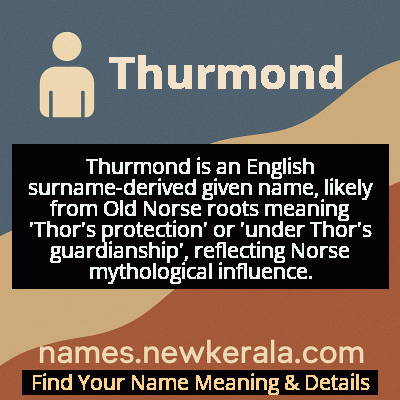Thurmond Name Meaning & Details
Origin, Popularity, Numerology Analysis & Name Meaning of Thurmond
Discover the origin, meaning, and cultural significance of the name THURMOND. Delve into its historical roots and explore the lasting impact it has had on communities and traditions.
Name
Thurmond
Gender
Male
Origin
Christian
Lucky Number
5
Meaning of the Name - Thurmond
Thurmond is an English surname-derived given name, likely from Old Norse roots meaning 'Thor's protection' or 'under Thor's guardianship', reflecting Norse mythological influence.
Thurmond - Complete Numerology Analysis
Your Numerology Number
Based on Pythagorean Numerology System
Ruling Planet
Mercury
Positive Nature
Adventurous, dynamic, curious, and social.
Negative Traits
Restless, impatient, inconsistent, prone to indulgence.
Lucky Colours
Green, white.
Lucky Days
Wednesday.
Lucky Stones
Emerald.
Harmony Numbers
1, 3, 9.
Best Suited Professions
Sales, marketing, travel, entertainment.
What People Like About You
Versatility, charisma, adventurous spirit.
Famous People Named Thurmond
Strom Thurmond
Politician
Longest-serving senator in U.S. history (48 years) and South Carolina governor
Thurmond Wood
Military Officer
U.S. Army major general who served in World War II and Korean War
Thurmond Knight
Academic
Renowned professor of medieval literature at Cambridge University
Thurmond Bailey
Musician
American gospel singer and member of the Caravans gospel group
Name Variations & International Equivalents
Click on blue names to explore their detailed meanings. Gray names with will be available soon.
Cultural & Historical Significance
The name's journey through history reflects broader cultural exchanges between Norse and Anglo-Saxon societies. During the medieval period, Thurmond and its variants served as markers of ethnic identity and social status within the complex tapestry of British society. The preservation of such names despite religious and political changes demonstrates the enduring power of cultural heritage and the adaptability of naming traditions. In modern times, Thurmond continues to carry this rich historical legacy, appealing to those who value names with deep roots and meaningful connections to ancestral traditions.
Extended Personality Analysis
Individuals named Thurmond are often perceived as strong, protective, and reliable figures who embody the name's meaning of 'Thor's protection.' They typically exhibit natural leadership qualities, combined with a steadfast determination that helps them overcome challenges. These individuals are frequently described as having an inner strength and resilience that others find comforting and inspiring. Their protective nature extends beyond physical safety to emotional support, making them valued friends and family members who create secure environments for those around them.
Thurmonds often possess a practical, grounded approach to problem-solving, combined with a strong sense of justice and fairness. They tend to be traditional yet adaptable, honoring their roots while navigating modern complexities. Many display a quiet confidence rather than overt aggression, reflecting the mature strength associated with their namesake deity's protective role rather than just his warrior aspects. In social settings, Thurmonds are often the stabilizing force in groups, providing wisdom and support during difficult times. Their combination of strength and compassion makes them natural caregivers and community leaders who earn respect through consistent, reliable action rather than dramatic gestures.
Modern Usage & Popularity
In contemporary naming practices, Thurmond remains a distinctive choice that appeals to parents seeking names with historical depth and powerful meaning. While never achieving widespread popularity, the name maintains a steady presence, particularly in regions with Scandinavian heritage like the American Midwest and Pacific Northwest. Modern usage reflects several trends: the revival of traditional names, interest in Norse mythology and Viking history, and the desire for unique but meaningful names. According to naming statistics, Thurmond appears most frequently as a family name being repurposed as a first name, often honoring ancestral connections. The name's rarity in the 21st century makes it stand out while avoiding the trendiness of more popular Norse-inspired names. Contemporary Thurmonds often appreciate their name's distinctive quality and the conversation-starting opportunity it provides regarding its origins and meaning.
Symbolic & Spiritual Meanings
Symbolically, Thurmond represents the convergence of divine power and human protection, embodying the concept of sacred guardianship. The name carries the metaphorical weight of being a 'human fortress' - someone who provides security and stability to their community. It symbolizes the thunderous power of nature harnessed for constructive, protective purposes rather than destruction. The combination of Thor's elemental might with the concept of protection creates a rich symbolic tapestry of strength tempered by responsibility and wisdom. Metaphorically, Thurmond represents the archetype of the reliable protector who uses their inherent power wisely and justly, much like the mythological Thor who protected both gods and humans from chaotic forces. The name also symbolizes cultural continuity and adaptation, as it successfully navigated the transition from pagan to Christian societies while maintaining its core protective meaning. In psychological terms, Thurmond embodies the human virtues of courage, loyalty, and steadfastness in facing life's challenges.

